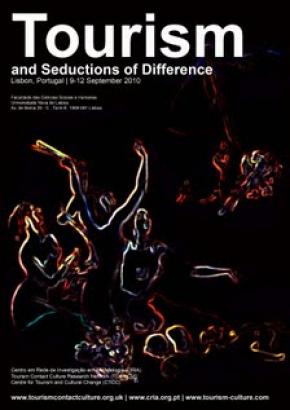Tourism and Seductions of Difference | Lisbon, Portugal | 9-12 September 2010
 Who, or what are tourists seduced by? What constitutes their arousal? How do tourists learn what to be seduced by? How is the tourist experience and the temptation to travel framed? What can these attractions tell us about the moral order of tourism and modern culture? How are forms of local, ethnic, gender and national self being shaped and maintained in the contact zones of tourism? How are tourist attractions assembled to entice tourists? How is seduction in tourism being politically framed? What are the threats and consequences of seducing tourists? What happens when tourists seduce? How can seduction work as a means for resistance? What happens when seduction is rejected?
Who, or what are tourists seduced by? What constitutes their arousal? How do tourists learn what to be seduced by? How is the tourist experience and the temptation to travel framed? What can these attractions tell us about the moral order of tourism and modern culture? How are forms of local, ethnic, gender and national self being shaped and maintained in the contact zones of tourism? How are tourist attractions assembled to entice tourists? How is seduction in tourism being politically framed? What are the threats and consequences of seducing tourists? What happens when tourists seduce? How can seduction work as a means for resistance? What happens when seduction is rejected?
As tourism research spreads into the social sciences, this Conference will tackle one of the central ontological and phenomenological premises of tourism, the fascination with the idea of ‘Others’. Anthropologists have studied how separations between ‘Self’ and ‘Other’ become part of various public and personal aesthetics of everyday life. They have studied how the idea of differences between people, temporalities and places enable social actors to constitute and maintain selfhood within a wider cosmological scheme of social life. In the field of tourism practice, one of the most basic premises consists in temporarily overcoming difference, be it through the journey to a ‘different’ place, the eating of ‘different’ food, the contact with ‘different’ people. Whatever their ontological underpinning, Self and Other are almost ceremonially brought into contact. Self is deliberately immersed in the realm of an Other. Moreover, in the post-touristic context ‘back home’, the visited Other seems to perpetuate a presence, a sympathetic quality. It has penetrated the touristic body, is invoked in travel stories and embodied in photographs and souvenir objects. While rhetorically and socially separated, ‘Self’ and ‘Other’ hence appear here in fact mutually constitutive, exerting seductive powers upon each other, ‘bewitching’ and ‘colonising’ each other, invoking each other and making each other a fetish of their own existence. The touristic immersion in the Other seems part of an ontological work which enables the maintenance of Selfhood.
This Conference will explore the seductive powers underlying this immersion of Self in the Other and the forms of social life and exchange its shapes at different scales of social life. It will bring together around 200 academics from more than 30 countries presenting 150 papers during four days. The Conference is likely to be the largest anthropological event ever focusing on tourism. Download a draft programme (V2.85 updated 11 August 2010). It also includes a film festival, various study tours, an ‘intergenerational’ networking event and a book fair. The philosophy of this event and of the network of researchers who have been organising it is to be open and accessible. For that reason, the registration fees were fixed at a strict cover-cost basis and include all lunches, coffee breaks and a dinner.
Organisers
Centro em Rede de Investigação em Antropologia (CRIA)
Tourism Contact Culture Research Network (TOCOCU)
Centre for Tourism and Cultural Change (CTCC)

